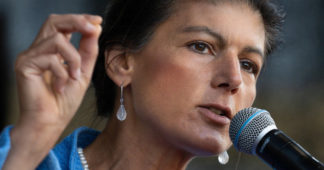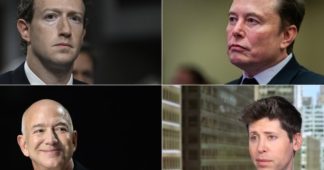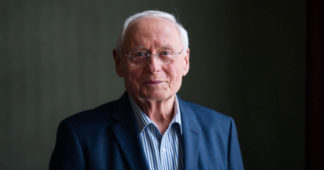By Thomas Fazi
Feb 22, 2025
At the ripe age of 69, Friedrich Merz has waited decades for this moment. Ahead of Sunday’s election, he is Germany’s chancellor-in-waiting, with his Christian Democratic Union (CDU) predicted to secure 30% of the vote. He’ll have to cobble together another coalition of disparate parties, but Merz won’t mind. Come Monday morning, he will have completed one of the most remarkable comebacks in recent political history.
Merz joined the party decades ago as a student. But today, he is effectively running on a “Make Germany Great Again” platform — a calculated attempt to win votes from the Alternative for Germany (AfD) by shifting his party to the Right on issues such as immigration. His cynicism here shouldn’t be underestimated: like Donald Trump in America, the millionaire Merz is a corporate king in conservative clothing.
Merz, let’s not forget, has long represented the interests of some of the world’s most powerful corporate and financial elites, most notably as a key representative of BlackRock in Germany between 2016 and 2020. Indeed, if Merz is elected, Germany will become the first country to be ruled by a former BlackRock official. But his ties to elite institutions go back much further: for over two decades, even before joining BlackRock, he embodied the revolving door between politics, business and finance.
After the 2002 federal election, Angela Merkel, the then-leader of the CDU, secured the chairmanship of the parliamentary group, while Merz was appointed as her deputy. Their relationship, however, was far from breezy, and Merz resigned just two years later, gradually withdrawing from politics until he left parliament in 2009. Yet he struck gold even before his departure. In 2004, he was hired as senior counsel by the international law and lobbying firm Mayer Brown, a heavyweight in the industry with an annual turnover of billions.
Here, Merz discovered a far more fruitful relationship. As Werner Rügemer, author of BlackRock Germany, explains, at Mayer Brown Merz helped facilitate deals that promoted the interests of US capital in Germany, encouraging American investors to buy companies in the Federal Republic. The result was the sale and restructuring of thousands of German firms, which involved slashing jobs and freezing wages — an approach openly praised by Merz in his book Dare to Be More Capitalist. No doubt keen to embody his book’s thesis, during this period Merz also sat on the supervisory and administrative boards of several major corporations. And then BlackRock, arguably one of the most powerful companies to ever exist, came knocking. How could Merz say no? Pharmaceuticals, entertainment, media and, of course, war — there is virtually no sector that BlackRock won’t try and profit from.
The attraction of hiring Merz isn’t hard to glean. He facilitated meetings between BlackRock CEO Larry Fink and German politicians, helping to shape the policies that would benefit the company and its vast portfolio of investments. Under Merz’s influence, for instance, BlackRock became one of the largest non-German shareholders in many of the country’s most important companies — from Deutsche Bank to Volkswagen, BMW to Siemens. Yet his work wasn’t just about increasing profits for shareholders; it was also about shaping a political environment where corporate interests were aligned with government policy. By happy coincidence, it also created a climate in which someone like Merz could easily flit between big business and the Bundestag.
And so it came to pass in 2021, when Merz, armed with a bulging bank balance and two private jets, returned to politics as the leader of the CDU. Unsurprisingly, his political philosophy is firmly rooted in neoliberalism. He is a vocal proponent of privatisation and deregulation. This is often couched in promises to reduce bureaucracy and attract foreign investors. But, in reality, this corporate doublespeak is designed to mask his emphasis on private-sector solutions to public problems. Merz is a strong supporter of the privatisation of social welfare systems — to the benefit of companies such as BlackRock, a leader in private pension schemes. He has also traditionally been a staunch opponent of the minimum wage and of laws against unfair dismissal. Under his watch, German workers are very likely to see their wages continue to stagnate, or worse.
But then it’s hard to truly believe that ordinary Germans are Merz’s concern. Once a Davos Man, always a Davos Man — and his long history of representing powerful industries, including the chemical, financial and metallurgic sectors, suggests he will have other priorities. As chancellor, for instance, Merz could be called upon to regulate sectors with which he has long been associated — and which Mayer Brown, his former employer, still represents.
Recall, too, that under Merz’s leadership the CDU has received millions of euros in campaign donations from the very business interests he represented in the past — more than any other party. For both German and global corporate lobbyists, then, having Merz — a former colleague — as chancellor would be a dream come true. Or, as Rügemer puts it: “This is putting the fox in charge of the henhouse.”
Nor is this simply a matter of economics: Merz’s corporate connections shape his foreign policy as well. At heart, he’s a staunch Atlanticist, and a firm believer in America’s role as the guarantor of the global order. This ideological stance has led Merz to align with the US on issues such as the Nord Stream 2 pipeline, calling for the project’s cancellation long before the escalation of the Ukraine crisis. His hawkish position on foreign policy, particularly around his muscular support for Ukraine, further illustrated his alignment with America’s erstwhile geopolitical priorities — even at the expense of his own country’s core interests. After all, one of the main reasons for Germany’s contracting economy and ongoing industrialisation is its decision to decouple from Russian gas under strong US pressure.
Now, of course, Washington has a very different Ukraine policy. So will Merz be forced to abandon his Atlanticist beliefs? Not necessarily. Though his strong anti-Russian stance and militaristic tendencies seem at odds with Trump’s efforts to de-escalate the conflict, the reality is that their visions are more aligned than might initially seem to be the case. What, in the end, does Trump demand from Europe? Higher defence spending and a significant role in shouldering both the financial and strategic responsibilities for post-war security in Ukraine, something which could even involve the deployment of a European “peacekeeping” force.
These policies align neatly with Merz’s own vision. He has long advocated boosting Germany’s defence budget, a stance welcomed by his corporate allies in the German military-industrial complex. Now, in fact, he has joined the chorus calling for Europe to “take its security into its own hands”. Trump couldn’t ask for more. This strategic convergence, coupled with Merz’s conservative leanings, deep ties to the US financial and corporate sectors, and ingrained Atlanticism, all make him well-placed to become America’s European “vassal-in-chief” in our post-liberal era. This would place Germany back at the helm of a European Union that is both economically weaker and militarily emboldened — even as it remains strategically adrift.
This arrangement will be accompanied by much rhetoric about German and European “autonomy” — and possibly even heated public disagreements between Berlin and Washington. In reality, though, it would largely be a façade, for the new dynamic would merely serve European and American elites. The former would continue to stoke the fear of Russia as a means to justify more defence spending, directing funds away from social programmes and legitimising their continued crackdown on democracy. As for the latter, they would continue benefiting from Europe’s economic dependence on the US. All the while, people like Merz would be well placed to aid the further cannibalisation of Europe at the hands of US capital.
Not that we should be surprised. Over the past two decades, Merz, just like Trump, has proved himself a businessman first and a politician second. Yet unlike Trump, who at least has some populist credentials, Merz’s victory will be celebrated in the boardrooms of BlackRock and other major corporations, which can expect to see their bank balances start ticking steadily upwards. As so often, though, ordinary voters should not expect this bounty to flow their way.
We remind our readers that publication of articles on our site does not mean that we agree with what is written. Our policy is to publish anything which we consider of interest, so as to assist our readers in forming their opinions. Sometimes we even publish articles with which we totally disagree, since we believe it is important for our readers to be informed on as wide a spectrum of views as possible.











